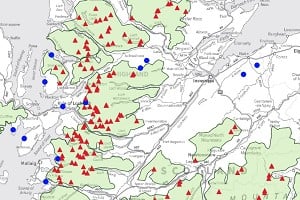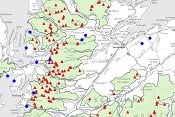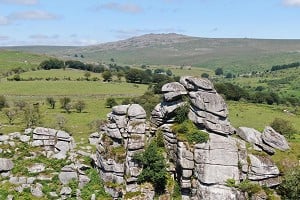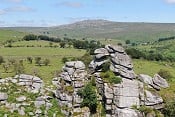
Kate Ashbrook, general secretary of the Open Spaces Society, fears that many public footpaths are in danger of being lost thanks to budget cuts, neglect and misplaced priorities. Though the Welsh government has recently consulted on 'improving opportunities to access the outdoors for responsible recreation' she sees a threat behind the apparently positive wording. And while it's worst in Wales, she says, England is following close behind.
We've reproduced this article from the autumn 2015 issue of the society's Open Space magazine.
In spring 1986 I wrote an article called 'When you go off Offa's …'. I had been walking part of the Offa's Dyke national trail and then tried to return on a route using connecting paths in Powys and Shropshire. As soon as I left the trail I encountered dreadful problems.
Things have improved since then, but the Welsh Government's green paper on access and outdoor recreation threatens a return to those dark days.
Despite positive statements in the paper about the importance of recreation, the government sees only burdens and costs in the public-path network—and in effect dismisses this great heritage. It proposes that local authorities review 'the opportunities available within their area for access and outdoor recreation and confirm a prioritised network of recreational routes and of access areas'.
Wales today…
We know what this means. National trails and a few promoted routes get top treatment while many others go to the bottom of the heap.
We have explained the obvious to the Welsh Government: if paths are not maintained they will not be used and so they enter a downward spiral of neglect. In the end they may be extinguished on the grounds that they are not needed for public use.
Yet Wales depends heavily on tourism which contributes more than 13 per cent of its GDP—and outdoor activity is an important part of that. Who will visit an unwelcoming countryside?
The paper offers the carrot of Scottish-style access (ie the freedom to walk everywhere subject to a code), but this would be at the expense of public paths: definitive maps would no longer be a definitive record and highways would be put in a hierarchy and moved at whim.
This is a shoddy trade-off. Why can we not retain the path system and have greater access?
… England tomorrow
If this happens in Wales now, it will happen in England tomorrow where local authorities suffering from government cuts are desperate to save money.
For example, last summer Derbyshire County Council proposed substantially to lengthen the time it takes to deal with path problems, from less than 14 weeks to up to 26 weeks. For ploughing and cropping that means the farmers get away with law-breaking. For bridges, gates and stiles it could be downright dangerous. Derbyshire is a portent.
If governments and councils baulk at their legal duties, their accountants can surely see that paths and access give an excellent return on investment.
The £16-million Wales Coast Path generated £32 million in visitor spending in its first year—what other investment gives a 100 per cent return?













Comments